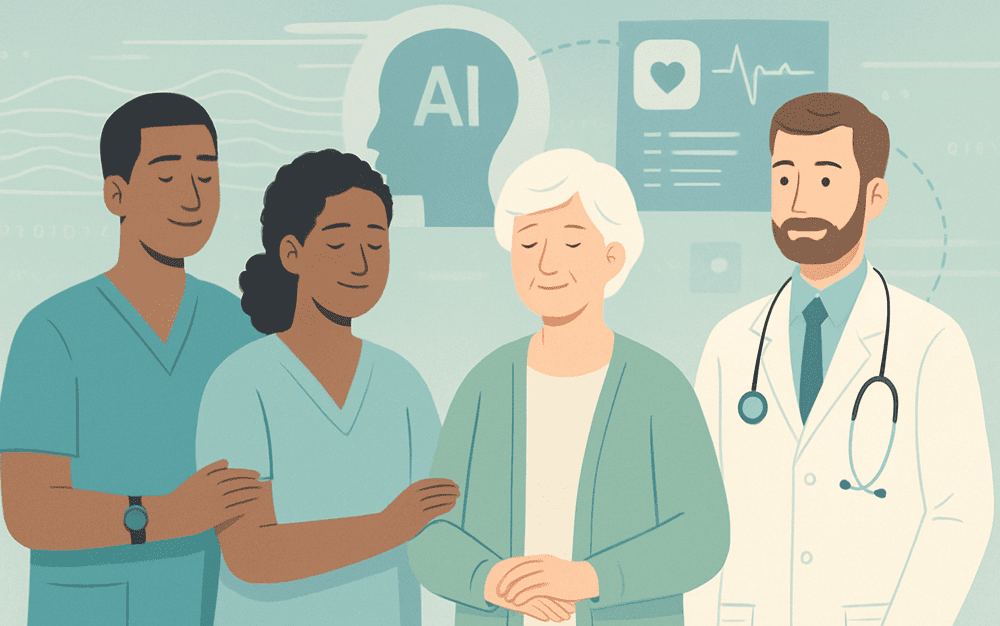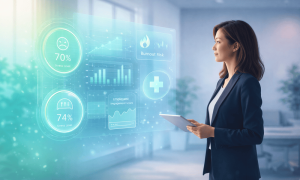Healthcare professionals often face overwhelming emotional demands. Compassion fatigue—emotional and physical exhaustion from caring intensely for patients affects between 60% and 85% of frontline staff, including nurses and physicians.
In the UK, a recent survey found 71% of GPs reported experiencing compassion fatigue, markedly undermining care quality – The Guardian.
Innovative solutions using AI for compassion fatigue are emerging, offering targeted support that helps healthcare workers stay resilient and present for their patients.
1. What Drives Compassion Fatigue?
Factors such as younger age, female gender, long hours, high work intensity, and emotional strain during the COVID-19 pandemic raise the risk for compassion fatigue.
Left unaddressed, it can degrade patient outcomes—patients may experience more errors, lower satisfaction, and even safety issues.
2. AI Offers Precise, Personalized Support

a) Predictive Monitoring & Wearables
AI-powered wearables analyze signals (like heart rate, sleep patterns, or EEG) to detect signs of exhaustion before fatigue becomes crisis. These systems use machine learning to track patterns in real time and signal when workers need rest or intervention.
b) Tailored Mobile Interventions
An AI app, Nurse Healing Space, recommends personalized burnout-reduction programs mindfulness, laughter therapy, reflective writing—based on user profiles. A pilot study showed notable drops in stress and burnout among participants.
These examples demonstrate how AI for healthcare wellbeing is delivering meaningful, user-centric support in high-pressure environments.
3. Workflow Relief Through Smart AI Tools
Administrative burdens drive burnout—nearly 75% of US physicians report overwhelming paperwork and time constraints. AI tools, such as LLMs embedded in electronic health record systems, assist with drafting responses to patient messages. Clinicians found these tools improved efficiency by 77%, and over half of the AI-generated drafts were usable without edits.
This efficient handling of routine tasks supports mental health by reducing stress—another dimension of mental health AI.
4. Benefits of Using AI in This Way
| Benefit | Impact on Healthcare Workers |
| Early detection of fatigue | Enables timely self-care before burnout intensifies |
| Personalized intervention (e.g. mobile app) | Delivers coping tools tuned to individual needs |
| Reduced administrative burden | Frees time for patient connection and self-care |
| Improved emotional bandwidth | Maintains empathy and quality of care |
5. Real-World Impact & Broader Context
National health bodies like the U.S. Surgeon General emphasize structural reforms and mental health access to support staff resilience.
AI solutions for employee performance through predictive wearables, tailored programs, and administrative support are emerging as practical enhancements that relieve strain and protect care quality.
6. Why Industry Leaders Should Care
- Improve Retention: Staff who receive proactive support are less likely to leave.
- Boost Quality: Less fatigue means fewer errors and better patient rapport.
- Cost-Efficient: AI reduces costs related to turnover and errors—health systems using AI have seen 25% operating cost reductions and better outcomes
- Future-Ready Care: Investing in mental health AI and compassionate tech strengthens a system’s adaptability and trust.
7. Bringing It Together: A Strategic Path Forward
- Invest in early-warning AI systems wearables that detect fatigue signals.
- Deploy tailored apps like AI-powered mental health programs to support staff individually.
- Integrate AI into workflows—documentation, messaging, education—so clinicians focus on care.
Conclusion
Healthcare workers bear the emotional weight of caregiving. By bringing AI for compassion fatigue into practice through predictive tools, bespoke interventions, and smart workflow support—we help preserve their empathy and effectiveness. The promise of technology here isn’t just efficiency, but deeper wellbeing and a healthier care environment.







